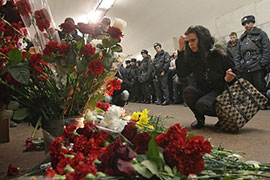Moscow metro blasts kill dozens
Female suicide bombers thought to be behind attacks on two stations that left 38 people dead.

Moscow’s chief prosecutor said the suicide bombers had been wearing explosive belts.
“We can assume that belts with explosive devices were attached to their bodies,” Yuri Syomin told reporters at Lubyanka square.
No group has claimed responsibility for the bombings.
‘Brutal methods’
Dmitry Medvedev, the Russian president, vowed to hunt down and annihilate those behind the attacks as he laid a wreath of red roses at the scene of the blast at Lubyanka station.
| In depth |
|
|
He said: “I don’t have the slightest doubt: we will find and wipe out all of them.”
The headquarters of Russia’s Federal Security Service (FSB), successor to the Soviet-era KGB, is located just above Lubyanka station.
Speaking to Al Jazeera, Martin McCauley, a Russian expert at the University of London, said: “I think it’s 90 per cent certain [the attacks came from the Caucasus], but in Russia nothing is certain.
“It [violence] has spread throughout the North Caucasus and the FSB think there’s about 200 activists who are really a problem for them, and they’re targeting them.
“But the trouble is they’re using such brutal methods that they antagonise the local population.”
Chechen threat
Irina Andrianova, a spokewsoman for Russia’s emergencies ministry, told the Itar-Tass news agency: “The blast hit the second carriage of a metro train that stopped at Lubyanka, at 0756 (0356 GMT).”
 |
| The government has vowed to hunt down and annihilate those behind the attacks [EPA] |
At least 12 people were reported to have been killed in the later blast at Park Kultury.
“It was very scary. I saw a dead body,” Valentin Popov, a 19-year-old student travelling on a train to Park Kultury, said.
“Everyone was screaming. There was a stampede at the doors. I saw one woman holding a child and pleading with people to let her through, but it was impossible.”
In February, Doku Umarov, the leader of a Chechen separatist group, said in an interview on a rebel-affiliated website that “the zone of military operations will be extended to the territory of Russia”.
Umarov, who claimed responsibility for the bombing of a passenger train travelling between Moscow and St Petersburg in November, warned that “the war is coming to their cities”.
‘Politically motivated’
“Both attacks took place on what is known as the Red Line, or line number one,” Al Jazeera’s Neave Barker, reporting from Moscow, said.
“This has to be seen as a politically motivated attack targeting what is perhaps one of the most symbolic signs of Russian authority in the capital when thousands of people are using one of the most heavily used metros in the world.”
The Moscow metro system is one of the world’s busiest, carrying around seven million passengers on an average workday.
Witnesses spoke of panic at the stations, with people falling over each other in dense smoke and dust as they tried to escape.
“I was moving up on the escalator when I heard a loud bang, a blast. A door near the passage way arched, was ripped out and a cloud of dust came down on the escalator,” a witness called Alexei told the state-run Rossiya 24 news television channel.
“People started running, panicking, falling on each other.”
Another witness at the Park Kultury station told RIA news agency: “People were yelling like hell.
“There was a lot of smoke and in about two minutes everything was covered in smoke,” he said.
‘Fighting terrorism’
Medvedev pledged to fight terrorism “without hesitation” on Monday.
 |
| The first blast took place close to the offices of the FSB security services [Reuters] |
“The policy to suppress terrorism in our country and the fight with terrorism will be continued,” Russian news agencies quoted Medvedev as telling an emergency meeting.
He also ordered that security be “significantly” strengthened on transport networks across the country.
Russian civil aviation authorities had already ordered increased security at airports after the explosions.
Separatist fighters from the North Caucasus region of the country have been blamed for previous explosions in Moscow and elsewhere in the country, however there was no immediate claim of responsibility for Monday’s attack.
A suicide bombing on a metro train in February 2004, which killed at least 39 people and wounded more than 100 other, was attributed to Chechen fighters.
‘Far from stable’
Alexander Pikayev, a Russian political and security analyst told Al Jazeera that more attacks were to be expected as the conflict with Chechen separatists was still unresolved.
“The situation is still far from stable. More attacks to be expected from the separatists,” he said.
“We have seen in the past few years and since 2004 attacks, police have been less present in the streets and heavier in undergrounds station in a bid to downplay the separatists threat.”
Pikayev said that the situation remained tense in Chechnya despite the government’s efforts to contain fighters there and in neighbouring republics.
“The government is trying to pour more money to create a better economic situation. Of course this will take years, meanwhile the situation will remain tight,” he said.
Russian forces fought two war with Chechen separatists, but last year declared that the conflict was over.
However, the violence has spread from Chechnya to to the neighbouring regions of Dagestan and Ingushetia.

 Medvedev vows to avenge blasts
Medvedev vows to avenge blasts